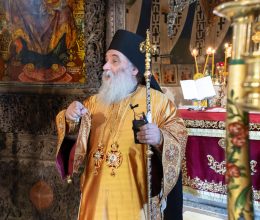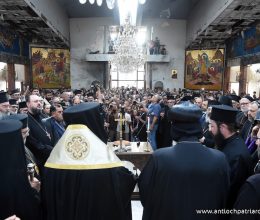Homily of His Grace, Bishop Partenij of Antania, delivered during the Holy Liturgy on the commemoration of the Holy Archdeacon and Protomartyr Stephen, at the venerable church of the Holy Chief Apostles Peter and Paul in Kičevo, on December 27, 2024 / January 9, 2025.
Most Reverend and Venerable Fathers,
Revered Monks and Nuns,
Honored Choir Members,
Beloved Faithful of Kičevo, and all of you who have come from other places and cities,
Today, on the third day of the celebration of the Nativity of Christ, we commemorate the Holy Apostle, Archdeacon, and Protomartyr Stephen, a man whose life, spiritual struggle, and martyrdom remain an eternal example of love, service, and humility.
In today’s reading from the Acts of the Apostles, written by the Holy Apostle Luke, we heard the events describing the selection of Saint Stephen as one of the seven deacons of the early Church, as well as his glorious martyrdom. He was among the first deacons—servants chosen by the nascent Christian community and ordained by the Holy Apostles to care for the tables, the poor, and all those in need. However, the ministry of today’s celebrated saint was not limited merely to the care of tables and widows, but extended into a luminous and unwavering witness to Christ through his teaching, his gift of consolation, and his wonderworking.
Saint Stephen was a true comforter of those afflicted by the sorrow of death, a servant of Christ filled with divine love and wisdom. To console those who suffer the anguish of mortal loss is a task that requires not only words but, above all, deep love, faith, and humility. Saint Stephen possessed this divine love, for the Holy Spirit rested upon him, making him a beacon of God’s consolation and mercy.
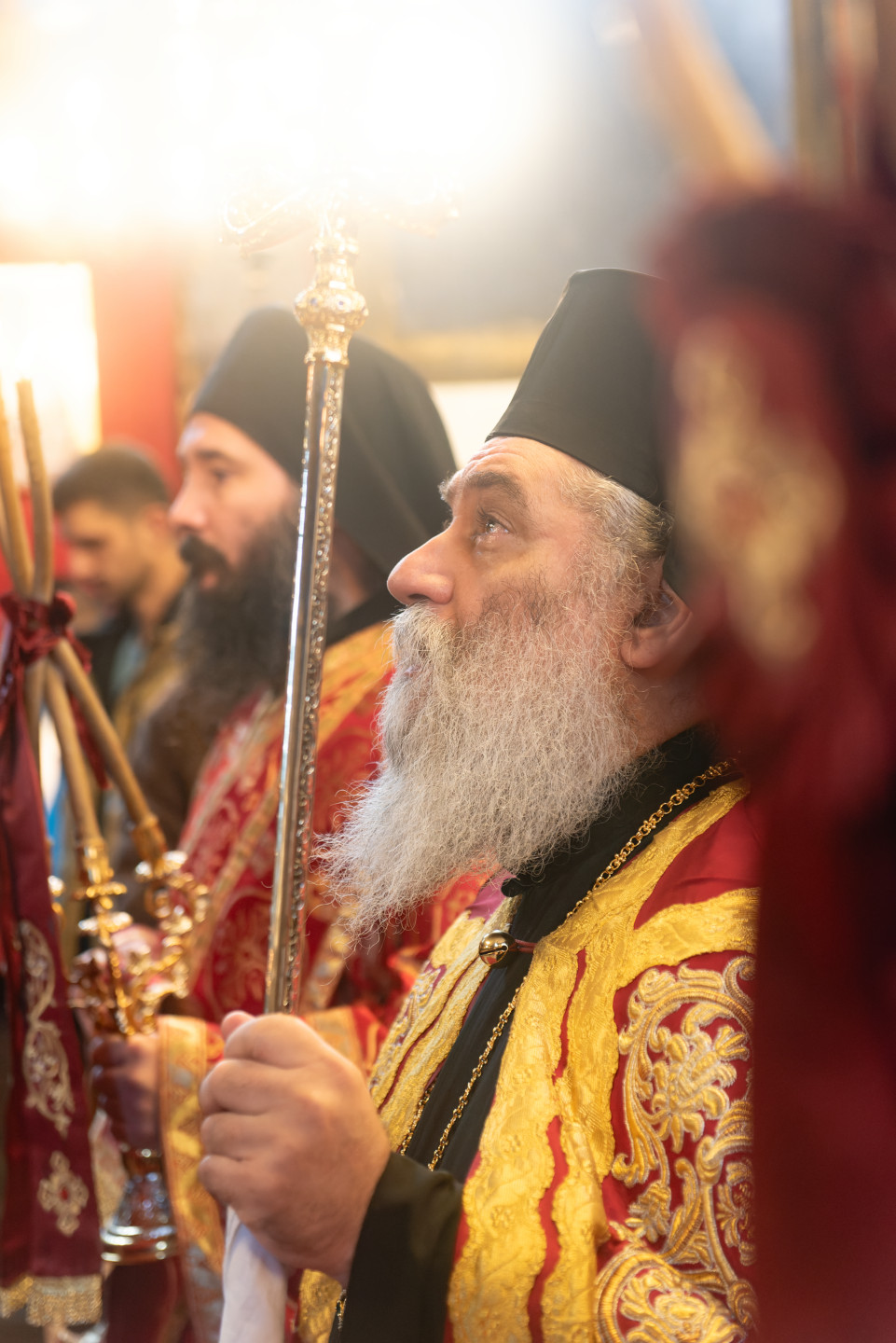
The life and testimony of Saint Stephen not only reveal to us the power of divine grace but also expose the tragedy of human obstinacy, hardness of heart, and resistance to truth. The man of God, filled with the Holy Spirit, bore witness to Christ not only through his deeds and love but also through his words. Yet it was precisely these words, which shone like jewels with the brilliance of truth, that provoked envy and wrath among the chief priests, scribes, and elders of the Jewish people.
He was falsely accused of violating the Law of Moses, of teaching blasphemy against the temple and against God. Because of this, he was brought before the Sanhedrin, where his harsh interrogation began. What we heard today from the Acts of the Apostles is part of his powerful sermon—his inspired defense before the Sanhedrin. Saint Stephen begins with the history of the righteous ones of the Old Testament—from Abraham, Jacob, and Moses, to David and Solomon, who built the renowned temple in Jerusalem.
And just when it seemed that his discourse was reaching its climax, the Saint, overwhelmed by divine illumination, suddenly interrupts his sermon and addresses his listeners with words that are not words of anger, but words of deep spiritual sorrow: “O stiff-necked and uncircumcised in heart and ears!” In these words, we hear the grief of the prophet and the love of the witness who sees the hardness of heart in those standing before him.
Saint John Chrysostom explains that Saint Stephen calls his listeners by such a name because they had shut their minds and hearts to God’s truth, refusing to hear the eternally true Word of God.
How terrifying is this spiritual obstinacy! It was not found among those who were unbelievers or unfamiliar with the Scriptures and the Law, but precisely among those who knew the Law, those who studied the Scriptures continually, and those who were appointed as guardians of the faith. This stubbornness, hardness of heart, envy, and habitual judgment rendered them incapable of recognizing the truth that the Archdeacon was revealing to them. And it was they—the very ones who considered themselves keepers of the Law and justice—who mercilessly killed the servant of God.
Beloved, obstinacy is not merely a disease of the past. That same obstinacy is present among us Christians today. How often are we inclined to shut ourselves off from the message of the Gospel, to cling to our own habits, our own convictions, and our own pride? How often are we stubborn and inflexible in our relationships, closed to repentance and transformation? Even in our time, just as in the time of Saint Stephen, obstinacy, hardness of heart, and egotism remain strongly present among us.
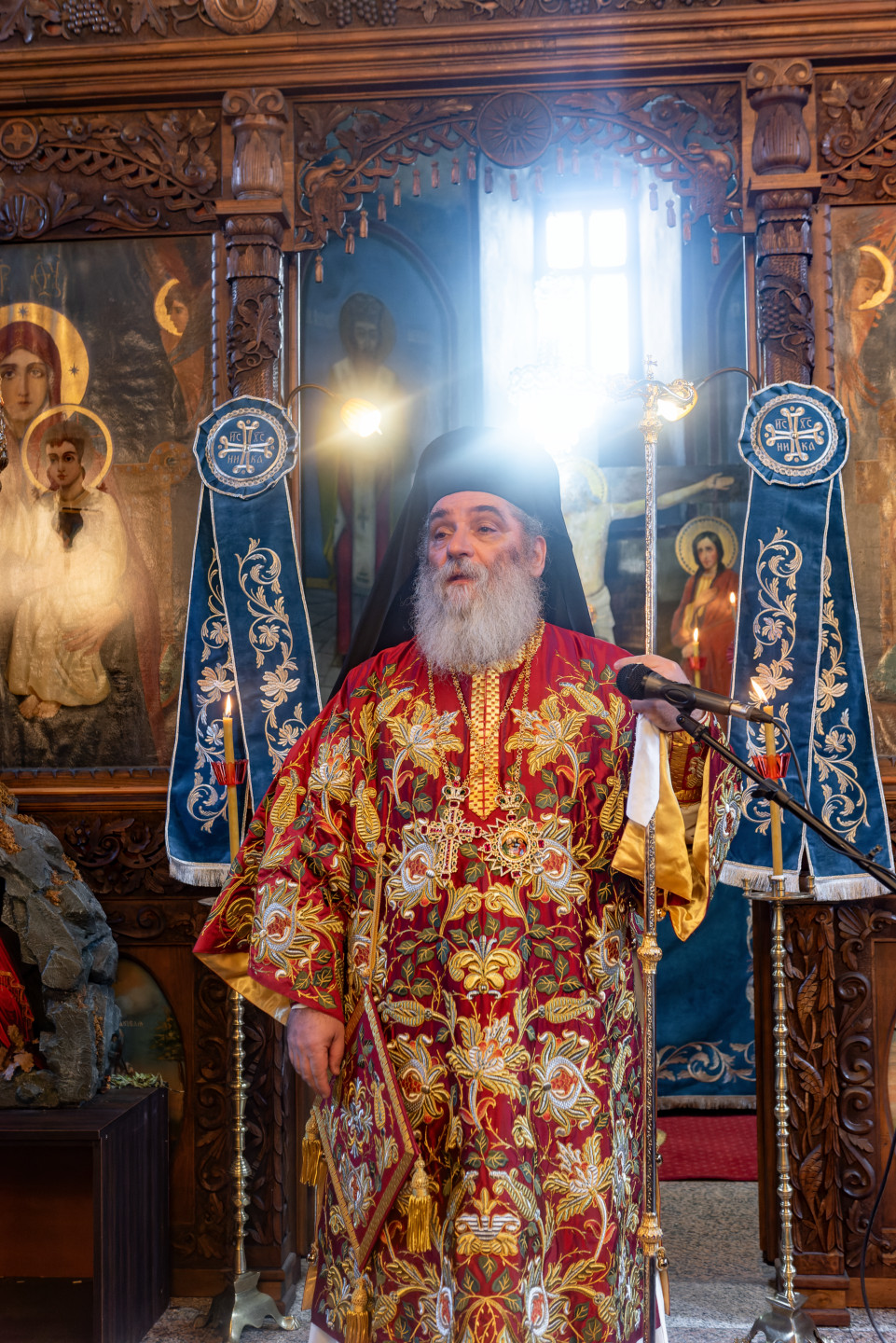
However, what makes our era particularly challenging is the way in which these spiritual passions manifest through modern technologies and social networks. In our time, everyone has become a so-called “teacher” on the internet. We see individuals who consider themselves great Orthodox Christians, yet they neither have proper theological education nor the necessary experience and calling, and yet they create websites, platforms, and profiles, proclaiming themselves as authorities in the faith. Those whom Holy Scripture calls “uncircumcised in spirit and heart” spread their own version of “truth” and “Orthodoxy,” devoid of love, humility, ecclesiastical awareness, and a true personal relationship with God.
These self-appointed teachers and instructors preach the faith without living it themselves. They elevate themselves above bishops, priests, and synods. Their actions and words do not bear witness to the love and truth of Christ. Instead, they sow confusion among the faithful, introduce divisions, and lead people into delusion, fanaticism, and condemnation. The irony is that many of them remain unrecognized—hidden behind anonymous or public profiles, or even automated bots—they use technology to spread their spirit of stubbornness, fanaticism, and judgmentalism.
Most recently, we live in an era where even artificial intelligence can provide answers to various theological questions—where it can tell us, for example, about the life of Saint Stephen or about different aspects of theology. Yet those whose lives have essentially turned into what we might call an “Orthodox android”—those who spend their time constantly immersed in social media, believing they are doing a great work for the faith and considering themselves to be true preachers and confessors—often misuse artificial intelligence for destructive purposes, most often for slander and condemnation.
However, we must remember that, first and foremost, artificial intelligence is not intelligence in the ontological sense of the word; rather, it is an unfortunately chosen term. In reality, it is nothing more than a vast database, or as it is now commonly called, a “cloud” of accumulated human knowledge, gathered with great effort, labor, and time, which operates according to mathematical algorithms. In other words, it functions as a form of appropriation of human experience without any effort or responsibility. Thus, the answers provided by such platforms are merely the product of algorithms and rapid, effortless acquisition of others’ work, rather than the fruit of living faith and spiritual experience. They cannot reveal to us the depth of Christ’s love and teaching, nor the transformative power of the Holy Gospel.
For this reason, it is especially important not to surrender ourselves to digital and superficial answers and writings. Never forget that faith is, above all, life—a life in Christ, a life in communion with Him and His Church. Only through living witness and personal experience, through participation in the Holy Liturgy and the Holy Mysteries of the Church, and through the struggle of love, self-sacrifice, and humility can we come to know Christ and truly be His disciples.
What is happening on social networks, where certain individuals—without true knowledge but with unchecked ambition—present themselves as authorities in the faith, is truly devastating for the fabric of the Church. Such people, unfortunately, not only fail to bear witness to Christ, but even more so, they sow confusion, division, and disorder among the faithful.
For example, a frustrated individual, who has proven unsuccessful in the entertainment industry or in other aspects of life, now engages in spreading absurdities and baseless slanders, all while misusing the logo and name of the Macedonian Orthodox Church. And thousands follow him on social networks, yet instead of guiding the faithful toward Christ, he causes division. In him, we see the reflection of those figures from the time of Saint Stephen who, filled with stubbornness and pride, refused to hear the truth and ultimately stoned the Archdeacon to death.
Even today, we witness a kind of stoning and lynching in a spiritual sense. We still encounter self-proclaimed righteous ones, self-appointed teachers, and self-styled guardians of the “purity of the faith”—people hardened in their opinions, unwilling to listen to others, to hear another perspective, to reflect, or to accept arguments and facts. Instead, they have already “constructed” their views, built upon pride, egotism, obstinacy, and opposition.

Beloved, stubbornness is a dangerous spiritual illness. It prevents us from hearing God’s call, from receiving His grace, and from transforming and renewing our lives. Pride, which nourishes stubbornness, separates us from our neighbors and from God, creating barriers and estrangement.
Today, as we contemplate the martyrdom of Saint Stephen, one undeniable truth is revealed to us: the Lord Jesus Christ came into the world to create a new world, a new humanity—persons of love and the grace of the Kingdom of God. The First Martyr for Christ sealed this truth with his personal witness. Both with his words and with his very blood, he confessed Christ, testifying that life in Him is the life of the new creation.
Christ came to form a person of love, of mercy, of nobility of spirit, of magnanimity and forgiveness. This is why, when Saint Stephen interrupted his sermon before the chief priests, it was a moment of divine illumination—a realization that his testimony would not end with words, but with the crown of martyrdom. At last, he was condemned by the hardened and unyielding priests, men whose hearts remained closed to the Gospel of Christ. Dragged outside the Sanhedrin, they stoned the innocent witness of God.
Yet, his death was not a defeat—it was a victory, a testimony to the love that transcends all human divisions and judgments. Like his Lord upon the Cross, Saint Stephen did not respond with a curse, reproach, or enmity toward his persecutors. On the contrary, his final words were a prayer for their forgiveness: “Lord, do not charge them with this sin!”
With this prayer, he not only fulfilled Christ’s commandment to love one’s enemies but also manifested the love of the new creation in Christ. This love, my dear ones, is the essence of the new man whom Christ came to bring into being. It is a love that transcends itself, that is unafraid of suffering, that does not repay evil with evil, but with virtue.
Saint Stephen became an example for us, not only as a martyr but as a model of the true Christian—a person who follows Christ not merely with words, but with deeds, with his entire being.
The Holy Protomartyr Stephen, who was the first to shed his blood for Christ the Savior, has shown us what we ought to be—people who follow Christ with faith, love, and a readiness for sacrifice. Through his spiritual struggle, it is as if he opened the book of life, in which all those who seek the Kingdom of Heaven began to be inscribed. The first pages of this book were written by the Apostles, all of whom suffered martyrdom for the faith. And then, throughout the centuries, this book continued to be filled with the names of saints, martyrs, and ascetics who bore witness to the Gospel with their very lives.
And now, in the frescoes and icons of our holy churches, we see all those who are alive in the Heavens, who intercede for us with their prayers—our advocates and guides on the path of salvation. Among them, of course, are our own local saints and martyrs. Here in Kičevo, for example, you have the Holy Prečista Monastic Martyrs—Evnuvij, Paisij, and Averkij—whose martyrdom was recorded in the margins of a monastery book, and whom God, in our days, has chosen to reveal to the world.
How many unknown saints have been inscribed in that heavenly book! From the time of the Roman Empire, through the Ottoman period, and even to our own days, countless people have borne witness to Christ through their faith, suffering, and love. Even today, among us, there are “martyrs of conscience,” silent ascetics—those who, in love and silence, endure great trials and tribulations, glorify God, judge no one, and imprint Christ into the hearts of others. They are the new witnesses of the Kingdom of Heaven—the life that Christ has offered to all of us.
And today’s Gospel parable of the unfaithful vinedressers reveals to us a profound truth: we are called to be heirs of God’s vineyard—not through pride or by mere right of inheritance, but through love and humility. We are part of that “royal priesthood” spoken of in the New Testament, called to cultivate the Lord’s vineyard with love, humility, and faithfulness.
The parable of the vinedressers reminds us that the Lord entrusts His vineyard to us—not so that we may destroy it or exploit it for selfish purposes, but so that we may preserve it, cultivate it, multiply it, and bring forth fruits of love, peace, and righteousness. And so, let us ask ourselves, beloved: How do we use the gifts that have been given to us? Are we truly heirs of God’s vineyard, or do our actions betray the blessing that has been bestowed upon us?
I sincerely thank all of you who have gathered here today, despite it being a working day, in such great numbers for this sacred liturgical assembly. A special word of gratitude I extend to the faithful people of Kičevo, as well as to those who have come from Skopje, Bitola, Prilep, Kruševo, and other cities. Your presence is a testimony to the strength of our faith and to the love we have for the Lord and His saints.
It brings me particular joy to once again mention the beautiful Kičevo choir, “Metropolitan Kozma of Prečista,” which always adorns our divine services, whether here or at the Monastery of Prečista Kičevska. I thank you for preserving, with your voices, that ancient Orthodox chant—our heritage and a gift from our forebears. This singing is not merely an art form, but above all, a prayer and enlightenment, a part of our spiritual culture, an inseparable element of our Macedonian identity and history.
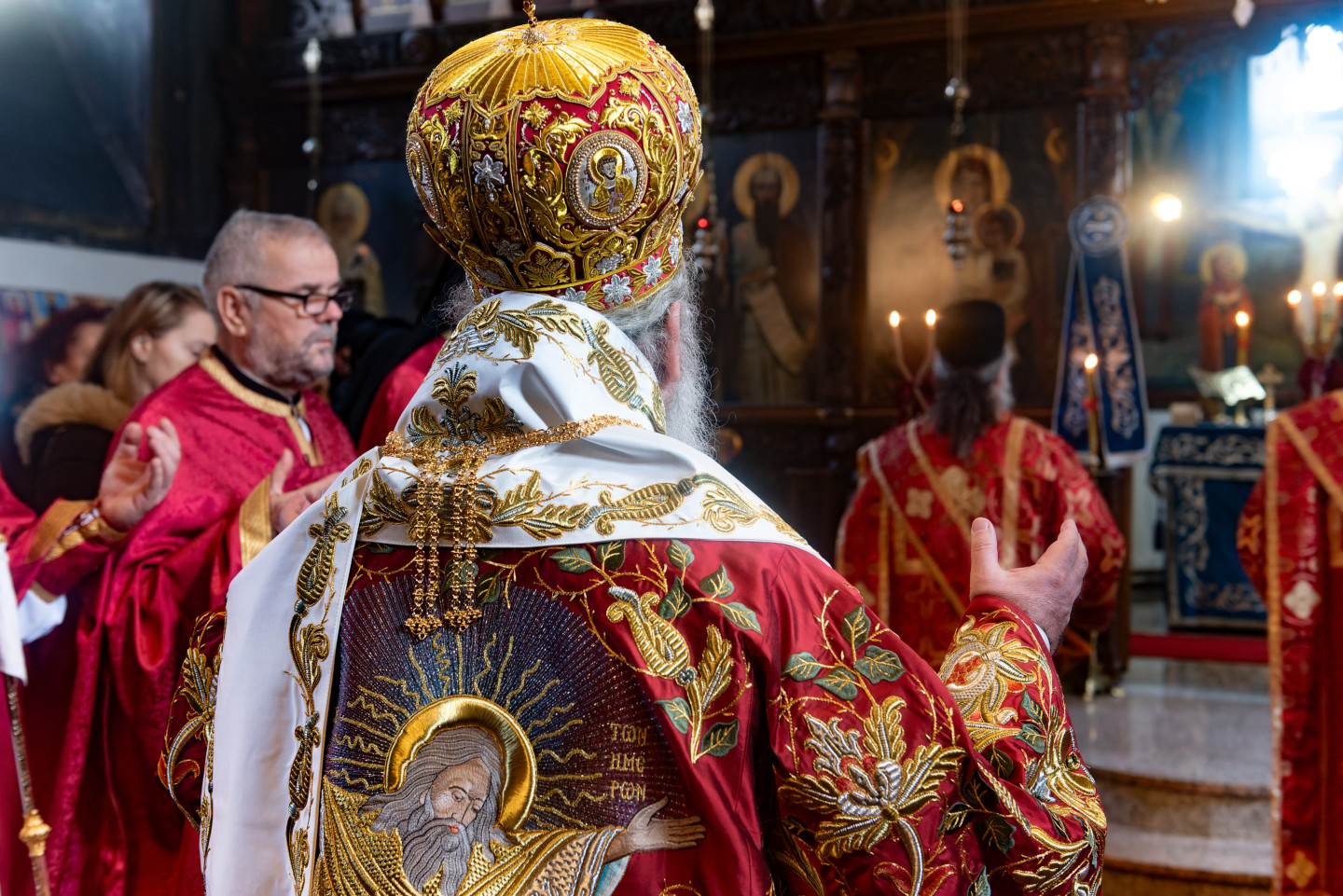
Beloved, we observe that this cherished city of Kičevo is increasingly becoming a vibrant spiritual center, not only for this region but for all of Macedonia. Your love, your faithfulness, and your ecclesial devotion are fruits of God’s grace. This means that when we place God above all else and strive for spiritual progress, our life will be blessed—both here and in eternity.
I would especially like to thank the honorable fathers, the priests of this city, for without their cooperation with the Monastery of Prečista and the sisterhood there, such beautiful and abundant spiritual fruits would not have been possible. They have selflessly opened their hearts to the young people, providing them with excellent opportunities to study Byzantine Orthodox chant and grow in the faith.
Let us pray to the Lord to enlighten us and grant us the strength to be like Saint Archdeacon Stephen—courageous, humble, and filled with love and forgiveness. May He fortify us in our faith and lead us toward spiritual growth. May He inspire us to continue our lives as members of His Body, the Church, glorifying His boundless mercy and love through the Holy Eucharist.
May you be blessed with health and long life, and may this Holy Liturgy be a source of grace for us all!
Christ is born!

